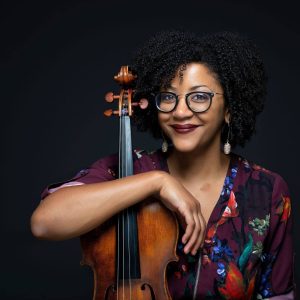Castle of Our Skins
Words by Okara Imani
The ancestors poured much strength into Ashleigh Gordon’s lineage: disciplined music heritage of lessons and mastery of craft, Jamaican blood upbringing that prides itself in hard, skilled work, and wise intentionality. With an inheritance like that, her laundry list of contributions and celebrations in community-based work is no surprise; from advocacy awards and fellowships to representing a Black experience of/in classical music on major platforms, to cultivating a culture for the present by reaching back for the influence of our predecessors in the spirit of Sankofa. All this has amounted to a deeply rooted and burgeoning Black arts community in Boston, Massachusetts, and continues to ripple out from her passion and purpose project, Castle of Our Skins — a Black arts organization that seeks to cultivate cultural curiosity and nourish Black artistry by centering a timeless Black experience, heritage and creativity through classrooms and concert halls.

Ancestor in poetry and storytelling, Nina Simone, wrote a poem that shed light on Ashleigh’s intentions and inspired its name. The poem echoes sentiments of filling up your corporal being with good and beautiful things. That way, you can experience it as a castle rather than a prison, and express that celebration of beauty and creation outward into the world proudly. This resonates throughout the artivist mission of Castle of Our Skins, which the talented teaching violist describes as “to center and to celebrate Black history, culture, arts through people, programming, and partnership…with the people, the artists, the composers, our collaborators, artists across all sorts of disciplines, historical figures, those currently living, youth, our audiences; making sure that Black people are centered in all of those spaces. We are Sankofa: taking history, looking back, catching those stories, and bringing them to life in ways that have resonance, grounded in African dysphoric cultural practices to make sure that there is a full understanding of our collective humanity and collaboration over time…how we intersect.”
 Honestly, Ashleigh Gordon has been so focused and intentional that paraphrasing is the best way to help illustrate the echo of the organization’s namesake in the founder’s own words! Hearing her speak, and perform, it is evident that she seeks to mimic the movement of the Black community not only in her works but in her craft. In a long line of focused, talented pianists and church singers, Ashleigh was poised to evolve her family’s musical genes and find her voice, as descending generations are wont to do. In the viola, it seems she felt the reverberations of a village grio crying out virtuosic, cascading stories, imparting the listener with rich folklore and history. She leans her instrument towards another, as I do with my voice, inspiring a collaboration that transcends time and space, and elevates sound. That dance and movement incorporated into her community programming? Age-old instincts of expressing our shared experience that connects the children of the African diaspora through our classic artforms.
Honestly, Ashleigh Gordon has been so focused and intentional that paraphrasing is the best way to help illustrate the echo of the organization’s namesake in the founder’s own words! Hearing her speak, and perform, it is evident that she seeks to mimic the movement of the Black community not only in her works but in her craft. In a long line of focused, talented pianists and church singers, Ashleigh was poised to evolve her family’s musical genes and find her voice, as descending generations are wont to do. In the viola, it seems she felt the reverberations of a village grio crying out virtuosic, cascading stories, imparting the listener with rich folklore and history. She leans her instrument towards another, as I do with my voice, inspiring a collaboration that transcends time and space, and elevates sound. That dance and movement incorporated into her community programming? Age-old instincts of expressing our shared experience that connects the children of the African diaspora through our classic artforms.
I hear this resonating from Ashleigh’s performance of Margaret Bond’s The Negro Speaks of Rivers, masterfully weaving the melody of a grio’s tales, carrying on the song begun by her ancestors, and building the chords her descendants will strike in their own time. Because they — and Florence Price, William Grant Still, Angela Brown, and Joshua Thompson — continue to root us in our musical heritage, we can withstand the deluge of Euro-centric influence residing proudly in the Castle of Our Skin.
Listen to this episode of the Melanated Moments in Classical Music podcast.







Leave a Reply